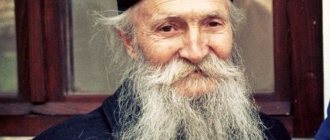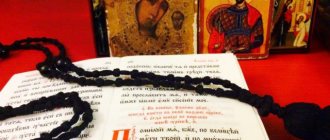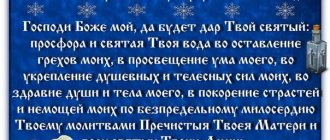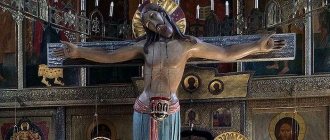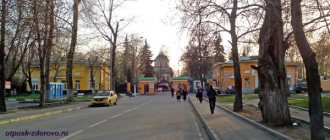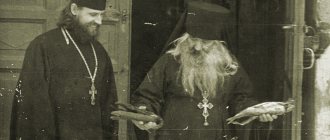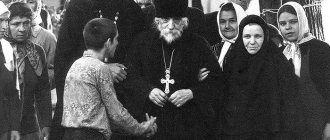Teenage years and early life
When childhood ended, no less harsh times came. Tomislav became seriously ill; no one could give accurate predictions about his future condition and life in general. It was then that the future monk decided to completely devote himself to God.
The father did not share his son’s desire to take monastic vows. The man was firmly convinced that his son should remain in the world. Then the father, by his own will, sent his son to a craft and trade school. Tomislav received a good education, which would allow him to earn his living later.
However, later he became convinced that his purpose was completely different. Tomislav had just turned 18 years old. The young man contracted a terrible disease. Doctors said that it was necessary to undergo a complex course of treatment. Tuberculosis increasingly influenced the health of the future elder. The doctors rendered a verdict that without continuing special therapy, Tomislav would not live more than five years.
This is interesting! Tuberculosis therapy in those days included not only taking medications, but also pumping the lungs with compressed air. The last procedure was quite unpleasant and time-consuming.
Monastic life
In 1932, he decided to withdraw from the world and enter a monastery. For this purpose, he sent a request to the Gornyak monastery. Meanwhile, the disease continued to progress and had already reached a dangerous stage.
Fomislav was asked to undergo an intensive course of treatment, without which, according to doctors, he would not have lived even five years. Relying more on the will of God than on the doctors’ forecasts, Fomislav refused to undergo further treatment and, after praying, left for the Gornyak monastery.
Here he met a Russian monk, who, understanding the seriousness of his intentions, recommended that he turn to the Milkovo monastery, where Russian monks who arrived from the Valaam monastery were then laboring: life in that monastery was more strict and better suited the aspirations and ideas of Fomislav.
After a meeting with the abbot of the Milkovo monastery, Father Ambrose (Kurganov), schema-archimandrite, student and follower of the Monk Ambrose of Optina, Fomislav was received into the monastery.
Believing that he had no more than five years of earthly life left, Fomislav, as he later recalled, tried to completely surrender to the Divine will, prayed a lot, zealously performed obedience, and absorbed the instructions of experienced brothers and fathers.
In addition to fulfilling his monastic duty, he paid a lot of attention to studying the Russian language, which later allowed him to join the treasury of Russian spiritual literature.
From prayer to prayer, from deed to deed, Fomislav grew in spirit. At the same time, he became stronger physically. The disease, little by little, began to recede.
After the death of Father Ambrose, the structure of life in the monastery began to change, disorder arose, and soon Fomislav was forced to move to the Gornyak monastery, then headed by the Russian abbot Seraphim.
In 1935, Fomislav, to the joy of the brethren, took monastic vows with the name Thaddeus. Soon after this he was ordained a hierodeacon.
Very little time passed before Hierodeacon Thaddeus was assigned to serve in the Rakovica monastery, which was under the jurisdiction of the Belgrade-Karlovac archdiocese. Here, with the blessing of Patriarch Varnava, he took a course at the school of icon painting.
In 1938, Father Thaddeus was ordained to the rank of hieromonk. Then, obeying the orders of the church authorities, he began to serve in the Pec Patriarchate. This ministry was interrupted by World War II.
Vitovnitsky's writings
After studying the works of various holy fathers, after learning the Holy Scriptures, Elder Thaddeus himself picked up a pen. Not a single work came out of his hand. The most famous is “Peace and Joy in the Holy Spirit.”
"Peace and Joy in the Holy Spirit"
This work was the result of the monk’s spiritual sublimity and love for people. The entire book can be divided into the following parts:
- “Conversations, teachings, sermons about spiritual life”;
- “We must carry the cross given to us to the end”;
- "Vitovnitsky hundred words".
Book of Elder Thaddeus Vitovnitsky
As are our thoughts, such is our life
Since childhood, Father Thaddeus began to collect and write down thoughts about life. His quotes are often used by other priests. The most famous are:
- “What are our thoughts, so is our life. If our thoughts are calm, quiet, noble and gentle, our life will be the same.”
- “When evil is in us, we pass it on, pour it out - on our relatives, in the family, in any circle where we are. … Destructive thoughts destroy our world, and we have no peace.”
What are our thoughts, such is our life
On October 6/19, 1914, the famous Serbian confessor, one of the most revered elders of the Serbian Orthodox Church of the 20th century, Archimandrite Thaddeus (Strbulović), was born, who acquired the gifts of unceasing prayer, humility, love, insight and spiritual reasoning.
We publish excerpts from the book “Archimandrite Thaddeus of Vitovnitsky”, published by the publishing house of the Sretensky Monastery.
***
Archimandrite Thaddeus Vitovnitsky / Comp. O.L. Rozhnev. - M.: Sretensky Monastery Publishing House, 2015. - 128 p.
The elder recalled: “From childhood I understood that there is service: parents serve children, children serve parents; and then the thought came to me that if one serves another, then I also want to serve God, because He is above everything. This is how the Lord called me from an early age.”
***
“From my early youth I set out to serve the Lord. I was in poor health, and I thought that I would spend the rest of my life as the Lord required.”
***
Elder Thaddeus throughout his life tried to accomplish the feat of daily serving the Liturgy, even in days of serious illness. He loved to repeat the words of the holy righteous John of Kronstadt as his own: “When I do not serve the Liturgy, I do not live!”
“When I don’t serve the liturgy, I don’t live!”
***
From 1981 until almost the end of his life, Father Thaddeus labored in the Vitovnitsky Monastery. The fame of the elder’s spiritual reasoning, wisdom and insight was widely spread among believers. The humble elder himself, when asked about his perspicacity, jokingly answered: “Well, yes, I’ll climb onto the windowsill and see far away...”
***
“People come to me with unspoken questions, but God knows what they need. Not me. They think that I answer their thoughts. The Lord answers, not me, not me..."
***
Father Thaddeus often worked around the clock and suffered from nervous exhaustion for years due to the heavy spiritual burden he carried. He sometimes said, “When we pray for others, we take upon ourselves some of their suffering.” Father Thaddeus also practiced extreme asceticism—he never went to bed.
***
Archimandrite Jovan (Radosavljevich) spoke about the elder: “The people of the entire Vitovnitsa region, and the whole country, reverence him as a great, exceptional confessor, prayerful monk and ascetic. Many Belgrade residents are shocked by his instructions and advice. His handsome face of a gray-haired, spiritual old man seems to be illuminated with light and joy. Such confessors are a gracious gift from God in our harsh times.”
***
Elder Thaddeus of Vitovnitsky left us spiritual advice and instructions for our edification. These tips and instructions are simple, but full of gospel wisdom and Divine grace. His teachings were passed on from mouth to mouth.
***
Photo: ibelieveorthodoxy.com
“As we think, so is our life.”
***
“Our thoughts affect not only us, but also the surrounding animal and plant world; moreover, they influence eternity, not only destroying the earth, but also multiplying evil in the Universe.”
***
“It is much better to teach with life than with words.”
“It is much better to teach with life than with words”
***
“Why does the Lord command us to love our enemies? It's not for their sake, but for our sake. As long as we retain in ourselves the thought of the insult that our enemies, friends, relatives and friends have inflicted on us, we have no peace and quiet and live in a hellish state. It is necessary to free yourself from this evil, throw it away as if nothing had happened, forgive everything.”
***
“We shouldn’t think too much about ourselves, because when we think about our needs, we get in our own way. We are our own greatest obstacle. We think about the evil that is around us, which hurts us, but if there were no evil in ourselves, it would not hurt us.”
***
“Severity in dealing with one’s neighbors is dangerous. Strict ones increase only to a certain extent and remain on bodily achievement. When dealing with people you need to be kind, meek, and condescending.”
“Severity in dealing with one’s neighbors is dangerous. When dealing with people you need to be kind, meek, and condescending.”
***
“You need to treat your neighbors equally. We do not dare to divide people: this one is sympathetic to me, this one is antipathetic. For then you declared war on this other person. And she will be intolerant of you. And although outwardly you did not give a reason, neither by word nor by movement, within yourself, with your thoughts, you caused it.”
***
“Stop thinking evil about your boss or work colleague, change evil thoughts to good ones, and see how the behavior of your former “enemies” will change.”
***
“People are changeable like the wind. Today they are for you, tomorrow they are against you. Who can stop the wind? Who can please the whole world? If you try to please everyone, you will definitely get into trouble. The Gospel says: wisdom comes to the simple. Let us be nothing before the whole world, so that we may become something before God.”
***
“When you find a kindred spirit, stay with her, for it is a great joy to be friends with like-minded people.”
***
“The key character trait is the basis for the transition to eternity. If we are peaceful and quiet, we join the ranks of saints and angels.”
***
“If your parents are atheists, and you are a believer, do not reproach or tease your parents with your faith, but pray for them and be kind to them.”
***
The elder was asked: “How should one pray to God?” The elder replied: “You need to pray as Father John of Kronstadt prayed. He carefully read the prayers, at some word he felt that his heart warmed, and peace and joy spilled into his soul, and then he prayed with feeling. The words of prayer must be said with faith that the Lord is looking at you and listening to you. And when something arises in your heart during prayer, “grab” it, dwell on it—“stay” in it.”
***
“The world is increasingly mired in sin and evil and confuses love and passions, but love and passions have nothing in common. Love is God, and passions are what comes from the spirits of evil.”
***
“The Lord will humble us with the help of the people around us. Someone causes our irritation, anger - and this will continue until we remain calm, until we learn this lesson.”
***
Photo: predanie.ru
“God, Who is all Love, knew that all created rational beings would not be able to maintain their position, and gave time from the creation of the world until the Last Judgment for rational beings to come to their senses, to return to the arms of their Parent. To unite with Absolute Good, with Absolute Love... But now, people have become more fond of evil than good. Fallen nature! It's easier to think bad than good. But when a person thinks badly, he has neither peace nor rest from such thoughts. How great is our fall!.. Terrible. We can't come to our senses. And we can’t do anything ourselves.”
***
Elder Thaddeus said: “All my life I have been tormented by the thought of the purpose of this life, I asked myself the question of what this life is for. The fact that a person works to achieve material wealth in order to eat and drink - is this really all that a person needs? “Thank God, in the life of St. Seraphim of Sarov it is said that the goal of our life is to return to the arms of our Heavenly Father, so that we, people on earth, will be like Angels in heaven, guided by the Holy Spirit.”
Don't get angry at children for their activity
Photo: Flickr.com
Celestial spirits affect children in different ways. A child cannot be still and calm all the time. In his development, he must continuously move, strive somewhere, at the same time, sometimes forgetting about parental instructions.
But he does something wrong not out of malice, but out of misunderstanding. And when parents get angry, fall into a rage, scold him, attack him with reproaches, and even beatings, the child does not understand what his fault is.
In such cases, parents need to first calm down themselves, and then peacefully, with love, explain to the child what his mistake is. If you do this constantly, day after day, directing thoughts from your heart to the child’s heart, then he will understand. If you start parenting in anger, on emotions, then mental hostility arises and then all the instructions of the parents pass by the mind of their child.
